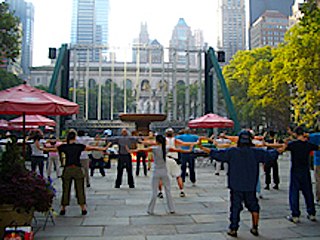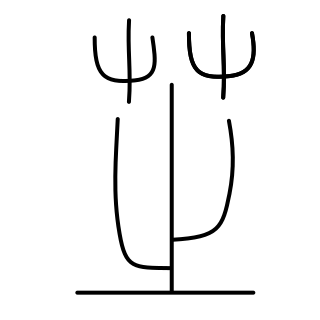 W
WTaoist philosophy also known as Taology refers to the various philosophical currents of Taoism, a tradition of Chinese origin which emphasizes living in harmony with the Dào. The Dào is a mysterious and deep principle that is the source, pattern and substance of the entire universe.
 W
WThe ancient Chinese term fǎn is a basic concept of Daoism. The Daodejing says "Reversal is the movement of the Way ... Being is born from nonbeing." Daoist texts use fan in three interconnected meanings: "return to the root", "cyclical return", and "return to the contrary". In Chinese cosmology, everything in the universe emerges from the primordial Dao, continually transforms, and inevitably returns to it, which parallels the eternal return in philosophy or cyclic model in physical cosmology. Fan is also significant in Chinese alchemy and Daoist meditation.
 W
WThe Foolish Old Man Removes the Mountains is a well-known fable from Chinese mythology about the virtues of perseverance and willpower. The tale first appeared in Book 5 of the Liezi, a Daoist text of the 4th century BC, and was retold in the Garden of Stories by the Confucian scholar Liu Xiang in the 1st century BC. It was also used by Mao Zedong in a famous speech in 1945.
 W
WNeidan, or internal alchemy, is an array of esoteric doctrines and physical, mental, and spiritual practices that Taoist initiates use to prolong life and create an immortal spiritual body that would survive after death. Also known as Jindan, inner alchemy combines theories derived from external alchemy, correlative cosmology, the emblems of the Yijing, and medical theory, with techniques of Daoist meditation, daoyin gymnastics, and sexual hygiene.
 W
WQigong, qi gong, chi kung, chi 'ung, or chi gung is a system of coordinated body-posture and movement, breathing, and meditation used for the purposes of health, spirituality, and martial-arts training. With roots in Chinese medicine, philosophy, and martial arts, qigong is traditionally viewed by the Chinese and throughout Asia as a practice to cultivate and balance qi, translated as "life energy".
 W
WSelf-cultivation or personal cultivation is the development of one's mind or capacities through one's own efforts. Self-cultivation is the cultivation, integration and coordination of mind and body. Although self-cultivation may be practiced as a form of psychotherapy, it goes beyond healing and self-help to also encompass self-development and self-improvement. It is associated with attempts to go beyond normal states of being, and enhancing and endless polishing of a person's capacities and the development of innate human potential.
 W
WShijie, which has numerous translations such as liberation from the corpse and release by means of a corpse, is an esoteric Daoist technique for an adept to transform into a xian, typically using some bureaucratic ruse to evade the netherworld administrative system of life and death registration. The many varieties of shijie range from deceitful cases, such as a person feigning death by substituting the corpse of their recently deceased grandfather as their own, to supernatural cases, such as using a waidan alchemical sword to temporarily create a corpse-simulacrum, which enables one to escape and assume a new identity.
 W
WThe Tao of Physics: An Exploration of the Parallels Between Modern Physics and Eastern Mysticism is a 1975 book by physicist Fritjof Capra. A bestseller in the United States, it has been translated into 23 languages. Capra summarized his motivation for writing the book: “Science does not need mysticism and mysticism does not need science. But man needs both.”
 W
WWu wei is a concept literally meaning "inexertion", "inaction", or "effortless action". Wu wei emerged in the Spring and Autumn period, and from Confucianism, to become an important concept in Chinese statecraft and Taoism, and was most commonly used to refer to an ideal form of government, including the behavior of the emperor. Describing a state of unconflicting personal harmony, free-flowing spontaneity and savoir-faire, it generally also more properly denotes a state of spirit or mind, and in Confucianism accords with conventional morality. Sinologist Jean François Billeter describes it as a "state of perfect knowledge of the reality of the situation, perfect efficaciousness and the realization of a perfect economy of energy", which in practice Edward Slingerland qualifies as a "set of ('transformed') dispositions ... conforming with the normative order".
 W
WXian refers to a person or similar entity having a long life or being immortal. The concept of xian has different implications dependent upon the specific context: philosophical, religious, mythological, or other symbolic or cultural occurrence. The Chinese word xian is translatable into English as:(in Daoist philosophy and cosmology) spiritually immortal; transcendent human; celestial being (in Daoist religion and pantheon) physically immortal; immortal person; an immortal; saint (in Chinese alchemy) alchemist; one who seeks the elixir of life; one who practices longevity techniques (or by extension) alchemical, dietary, or qigong methods for attaining immortality (in Chinese mythology) wizard; magician; shaman; sorcerer (in popular Chinese literature) genie; elf, fairy; nymph; 仙境 (based on the folk etymology for the character 仙, a compound of the characters for person and mountain) sage living high in the mountains; mountain-man; hermit; recluse (as a metaphorical modifier) immortal [talent]; accomplished person; celestial [beauty]; marvelous; extraordinary (In new-age conception) seeker that takes refuge in immortality ; transcended person [self] recoded by the "higher self"; divine soul; fully established being
 W
WThe Chinese term zhī (芝) commonly means "fungi; mushroom", best exemplified by the medicinal Lingzhi mushroom, but in Daoism it referred to a class of supernatural plant, animal, and mineral substances that were said to confer instantaneous xian immortality when ingested. In the absence of a semantically better English word, scholars have translated the wide-ranging meaning of zhi as "excrescences", "exudations", and "cryptogams".